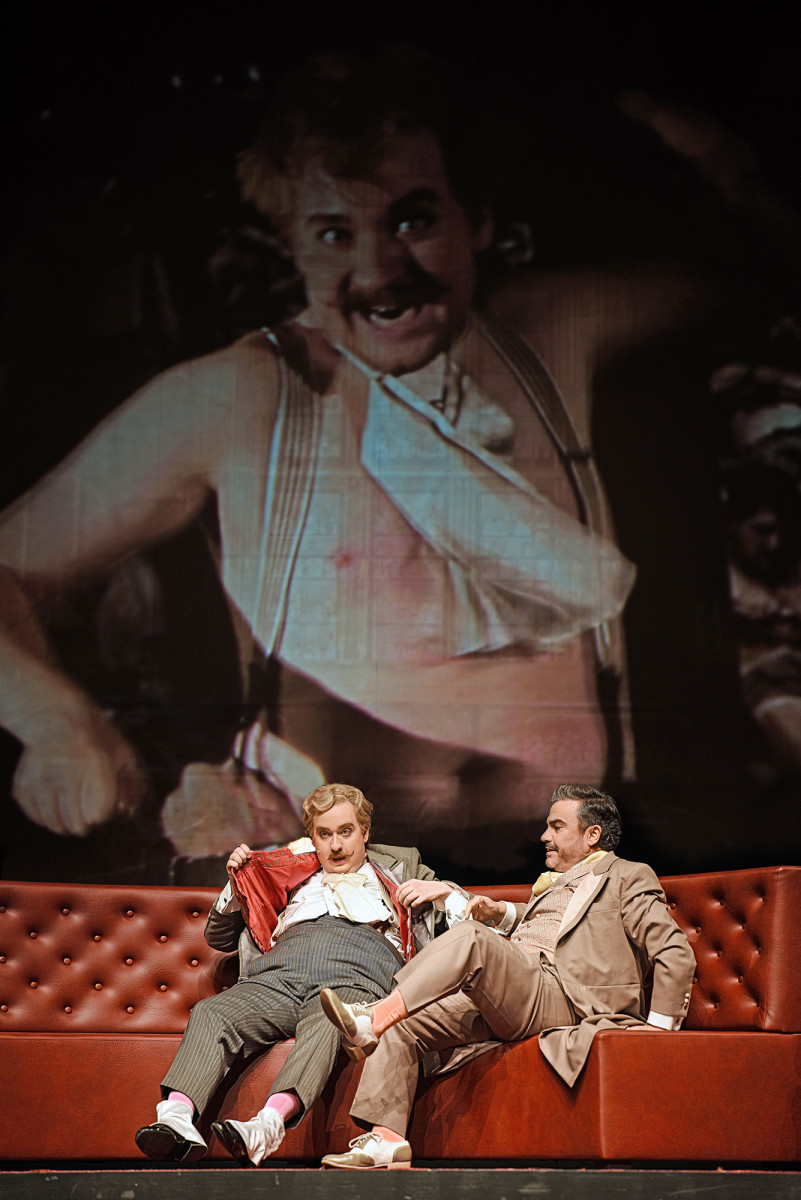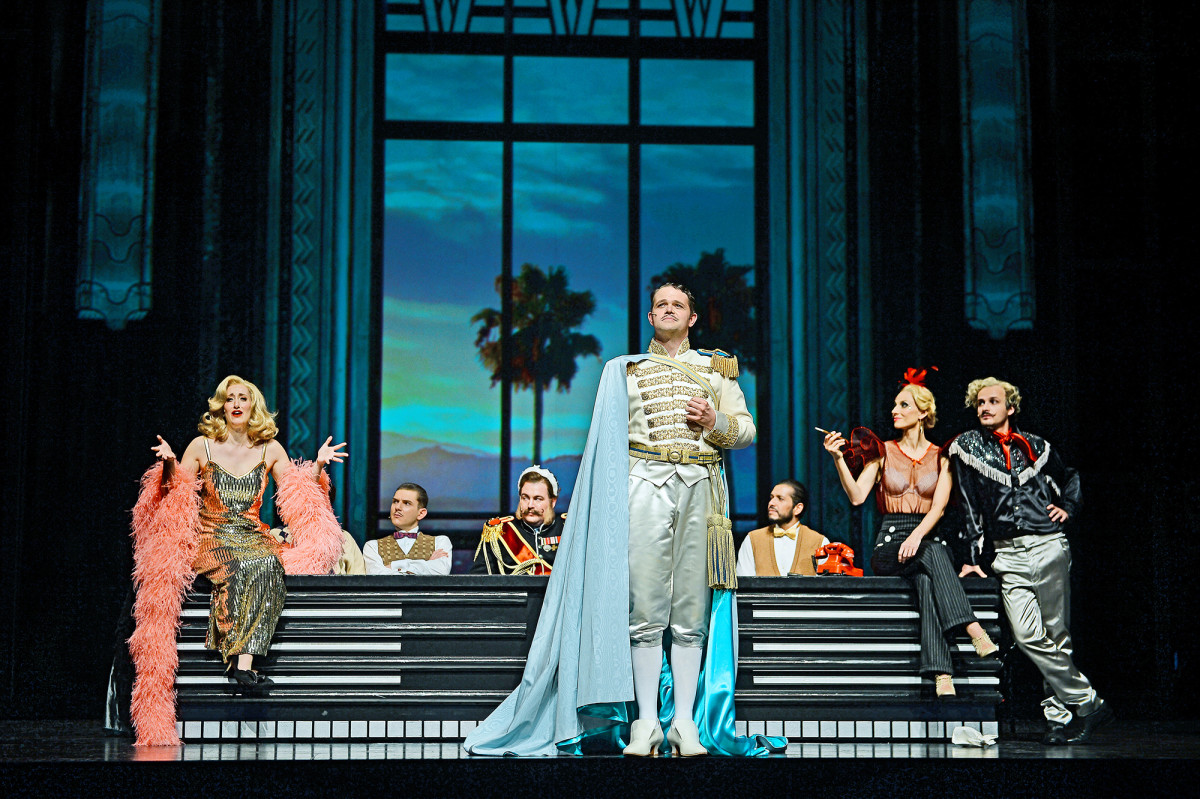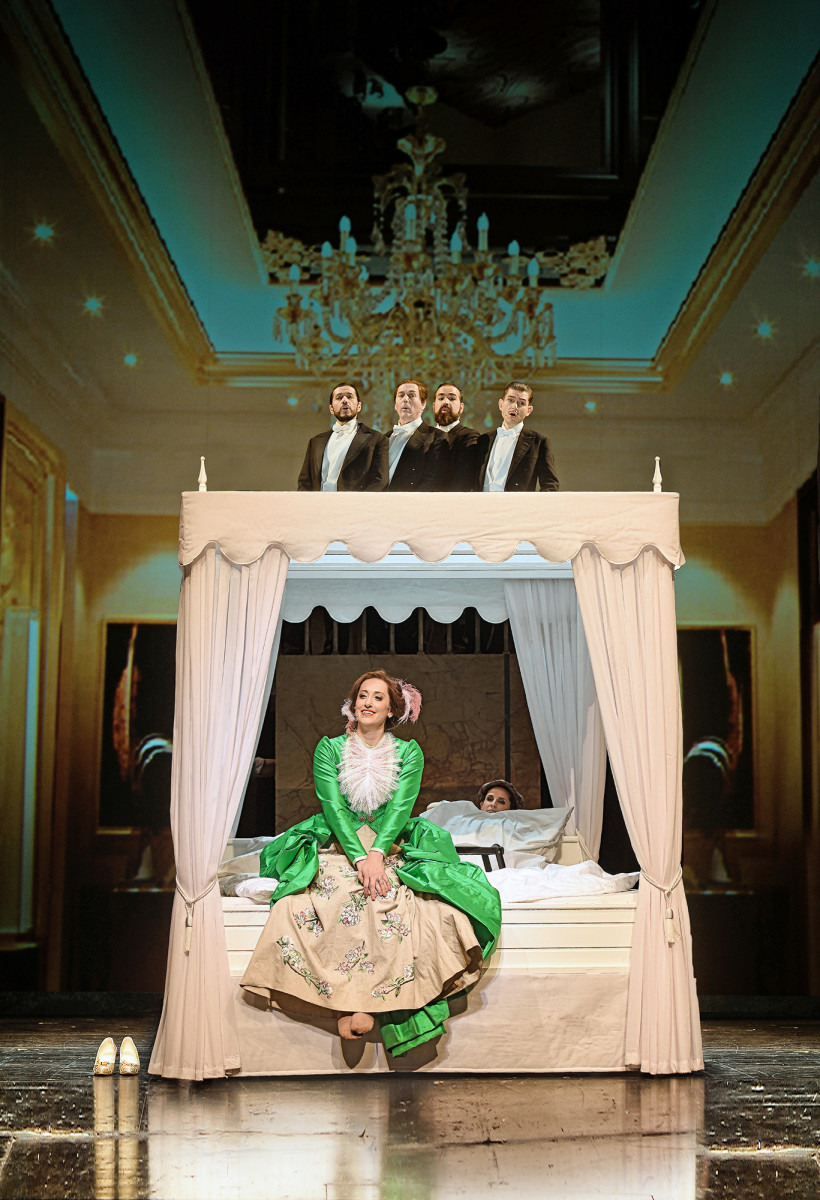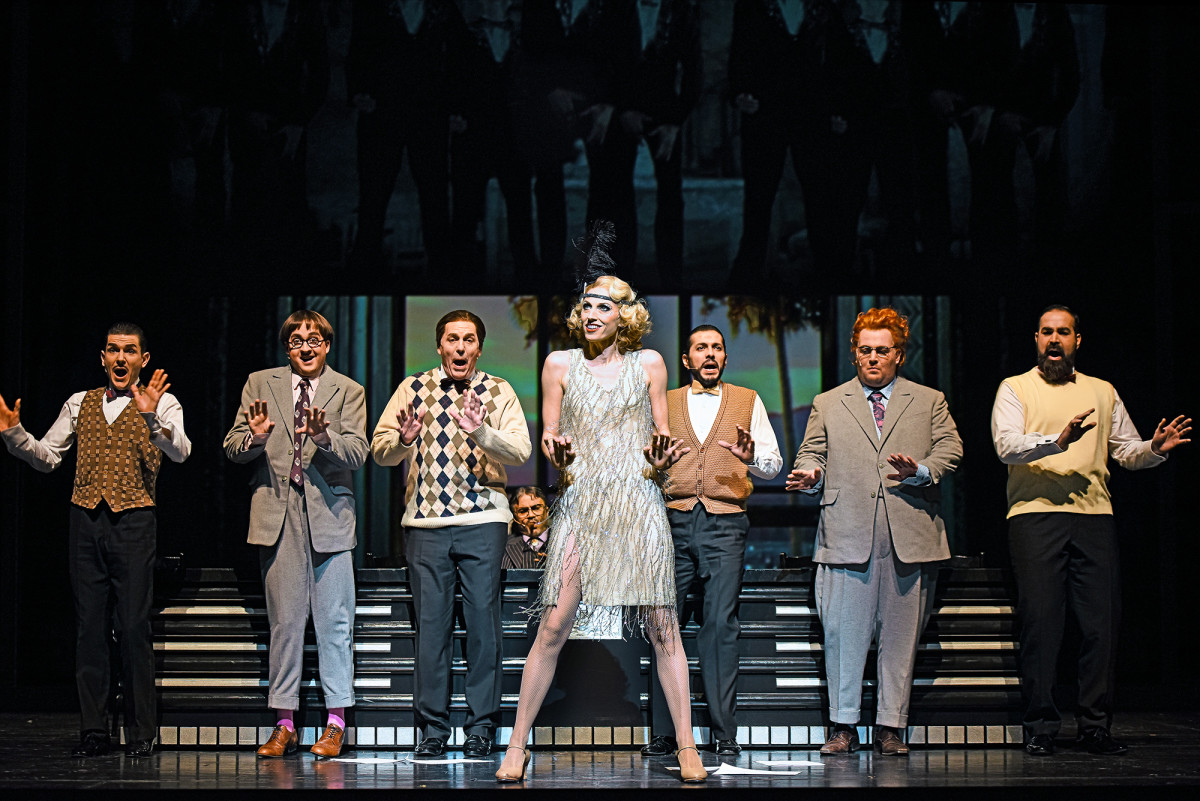John Groves
Operetta Research Center
9 January, 2019
After having had great success in Berlin with three operettas on a very grand scale – Viktoria und ihr Husar (1930), Die Blume von Hawaii (1931), and Ball im Savoy (1932) – Paul Ábrahám was forced by the German political situation to relocate his activities to Vienna. There he embarked on a “Lustspiel” with his two previous collaborators, Alfred Grünwald and Fritz Löhner-Beda. The result, Märchen im Grand-Hotel (1934), is almost a chamber piece, needing nine singing actors plus a male quartet, at Mainz called ‘he Lancashire Lads. They substitute for the chorus. And you get a much smaller orchestra than in Ábrahám’s previous opulent shows, making this first post-1933 operetta a fascinating new experience, more along the lines of Ábrahám’s film operettas with their more intimate (close up) style.

Original 1934 sheet music cover for “Märchen im Grand-Hotel.”
The first modern day (concert) performance took place in 2017 at the Komische Oper Berlin. Kevin Clarke penned a fascinating article on the operetta back then, which I will try not to repeat here. The first fully staged production anywhere – and the first production in Germany – took place 84 years after the Viennese premiere, in Mainz in December 2018.

Daniel Friedl and Murat Yeginer in “Märchen im Grand-Hotel” in Mainz. (Photo: Andreas Etter)
In his review of the Berlin performance, Kevin Clarke makes the point that, musically, Grand-Hotel is not at the same level of the three previous blockbusters. The ‘snappy’ songs “do not quite stand out to leave a lasting impression.” The best are probably “Jedes kleine Mädel“ and “Ich geh’ so gern spaziern.“ The score sounds ‘distracted at times, not fully focussed,’ wrote Clarke in 2017.
However, at the time it was a huge success in Vienna in the 30s and in Berlin 2017. The former because of the superstar casting, the latter because of conductor Adam Benzwi.

The royals in exile in “Märchen im Grand-Hotel” in Mainz. (Photo: Andreas Etter)
The plot was lifted from a play by Alfred Savoir about a waiter falling in love with a princess. In the operetta, a Hollywood producer and his daughter (Marylou) are looking for new, inexpensive, ideas for a movie. Their plan is to film ‘real life’ and in this case, the fate of a group of exiled royals from Spain. Hence there are both a prologue and an epilogue set in Hollywood, with the French Riviera two acts of the operetta sandwiched between. The paralles between ‘operetta royals’ such as Abraham, Grünwald (Gräfin Mariza) and Löhner-Beda (Land des Lächelns) having been exiled from Germany by the Nazis and the ‘real life’ royals in the operetta are pretty obvious, but humorously handled. The full horror of the Nazi regime was not yet evident.
The program book in Mainz makes the point that as Abraham had been born in a hotel, and lived much of his life in them, he was probably the best composer for the job!

Jennifer Panara and Annika Baumann, with the quartet on top, in “Märchen im Grand-Hotel.” (Photo: Andreas Etter)
The penniless Spanish princess, Infantin Isabella, was perfectly portrayed in Mainz by Jennifer Panara, immediately creating a very believable character together with a powerful soprano voice. Like all the rest of the cast, she was obviously having fun, and her sense of fun was infectious.
Likewise Nini Stadlmann as the typical American movie producer’s daughter: she had terrific energy and verve throughout the long evening, as well as being eminently watchable.
The director’s idea of Albert, the room service waiter (Michael Dahman), was to portray him as a ‘silly ass’ type, typical of Claude Hulbert, crossed with the slapstick of Norman Wisdom and George Formby. The trouble was that this did not work in the supposed romance with Isabella: one could not imagine anyone falling in love with someone so silly, except of course that Formby and Wisdom always got their girl in the end!
Prince Andreas, engaged to Isabella but also penniless, was played by Johannes Mayer who possesses a gorgeous tenor voice and was more than able to act this rather one-dimensional role.

Johannes Mayer and Nini-Stadlmann in “Märchen im Grand-Hotel.” (Photo: Andreas Etter)
Märchen im Grand-Hotel was directed by Peter Jordan and Leonhard Koppelmann, very definitely in the Barrie Kosky style. Realizing that the show is long (210 minutes) they decided on a very fast-paced, physical, slapstick style that was inventive and worked, even if by the end one was longing for some variety!
In collaboration with the designer, Christoph Schubiger, they chose a simple single-set design, on which was projected historic black and white film as well as ‘new’ black and white film, shot using the Mainz cast. It was often difficult to tell which was which!
The projections were imaginatively chosen to aid the atmosphere of what was happening on stage, but it did mean that one either watched the actors or the film; perhaps it was used too much?
Musically, the production was superb. Samuel Hogarth had clearly prepared everything thoroughly and with great attention to style. The orchestra sounded as if they always played this sort of music, aided by Mr. Hogarth at the grand piano playing jazz with a trio, either in the pit or onstage and another unnamed excellent pianist in the pit as well.

The ensemble and Nini-Stadlmann in “Märchen im Grand-Hotel.” (Photo: Andreas Etter)
All in all, I enjoyed Märchen im Grand-Hotel very much, but there are few songs, some very lengthy stretches of dialogue (thank goodness for the projections here!), and not one number that I could come out of the theatre singing, in spite of possessing a recording of the 2017 KOB performance.
My drama professor used to say that there was not one play or opera that could not be improved by being cut (he omitted ‘To Be or Not to Be’ from his production of Hamlet and said that no one would notice as they would all think they must have heard it – no one noticed!)
Grand-Hotel could do with about 45 minutes knocked off the running time, unless you have such stellar actors available as for the world premiere back in 1934 who are fun to watch in dialogue scenes forever and ever. Oscar Karlweis was one of them, playing the waiter.
But do try to see the show at Mainz as it is as well staged and you may not get another chance soon. Though, in Germany, you never know these days … look at the multitude of Ball im Savoy productions right now.
For more information (and a trailer), click here.

BUT Ball im Savoy is a MUCH stronger piece!
As usual a highly readable review… and I loved the hamlet anecdote! Thank you John.
Just saw Märchen Im Grand Hotel at Nürnberg Staatsoper and it was sensational – the sets were superb and the cast was terrific. My only difficulty was that I do not speak German and there were no supertitles in English to follow the story; enjoyable anyway!!!